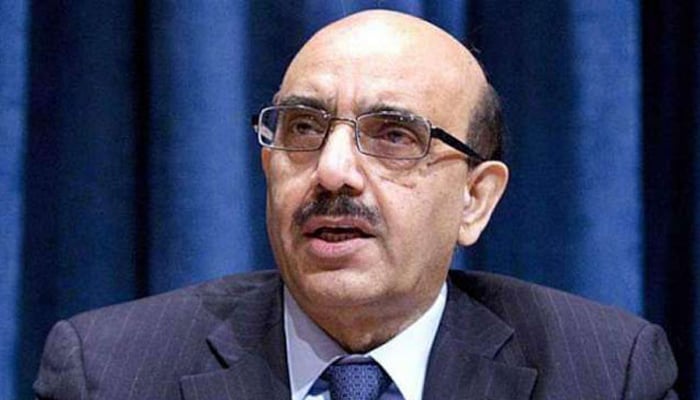Azad Kashmir President sees hope in US-China response to India
Azad Kashmir President was hopeful that India's clampdown in occupied Kashmir has reached a turning point, having attracted US pressure
WASHINGTON: Azad Kashmir President Sardar Masood Khan is hopeful that India's clampdown in occupied Kashmir has reached a turning point — as it has now attracted pressure from the United States.
Sardar Masood was visiting Washington to meet lawmakers, media, and experts after India on August 5 rescinded autonomy on occupied Kashmir and sharply curtailed ordinary people's communications.
"There is a palpable shift in the United States," the Azad Kashmir president told AFP. "The pro-India sentiment here in the United States prior to the August 5 steps was very strong because of the strong economic and strategic ties between the United States and India.
"But this is changing fast."
As evidence, he pointed to how a number of lawmakers have criticised the Hindu nationalist Prime Minister Narendra Modi's policies in what had been India's sole Muslim-majority state.
This week, 14 Democrats — led by Representative Pramila Jayapal — urged Modi to restore internet and cellular service for Kashmiris, saying in a letter that US residents had been unable to reach relatives.
President Donald Trump has literally rallied behind Modi, joining him at a gathering last month in Houston but the State Department has asked India to bring back communications and release detained political leaders.
Khan said he was also grateful to US and international media, who have faced restrictions in Indian Occupied Kashmir.
"The media has after decades spoken up for the people of Jammu and Kashmir and not the Indian establishment so that's a major change," he said.
Prime Minister Imran Khan, addressing the United Nations General Assembly (UNGA) last week, said India was plotting a "bloodbath" by sending in troops to the occupied Kashmir.
Sardar Masood said Azad Kashmir's youths were "seething with anger" and wanted to "fight for the rights of their brothers and sisters".
He added: "While we respect their sentiments and we share their sentiments, we do not want any unregulated activity across the Line of Control."
Khan said India was following an Israeli model, encouraging Hindus to settle in Kashmir and reduce the Kashmiri or Muslim majority in the state. He hailed the role of China, which arranged a rare UN Security Council (UNSC) meeting on Kashmir in August.
Chinese Foreign Minister Wang Yi also mentioned Kashmir in his address to the UN, calling for neither side to "unilaterally change the status quo".
"The people of Jammu and Kashmir and Pakistan are grateful to China for speaking up for the Kashmiris," Khan said.
-
Poll reveals majority of Americans' views on Bad Bunny
-
Man convicted after DNA links him to 20-year-old rape case
-
California cop accused of using bogus 911 calls to reach ex-partner
-
'Elderly' nanny arrested by ICE outside employer's home, freed after judge's order
-
key details from Germany's multimillion-euro heist revealed
-
Search for Savannah Guthrie’s abducted mom enters unthinkable phase
-
Barack Obama addresses UFO mystery: Aliens are ‘real’ but debunks Area 51 conspiracy theories
-
Rosie O’Donnell secretly returned to US to test safety












